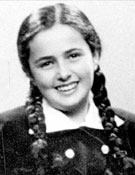Éva Heyman
Born
in Nagyvárad, Hungary
February 13, 1931
Died
October 17, 1944
Genre
More books by Éva Heyman…
“À partir d'aujourd'hui [10 mai 1944], officiellement, nous ne sommes plus dans un ghetto mais dans un camp. Sur chaque maison a été placardée une affiche où l'on peut lire tout ce qui est interdit avec la signature de Péterffy, lieutenant-colonel de la gendarmerie, commandant du camp-ghetto d'Oradea. En fait, tout est interdit, mais le plus terrible c'est qu'il n'y a qu'une seule peine : la mort. En cas de faute, peu importe sa gravité, nous ne sommes ni envoyés au coin, ni battus, ni privés de nourriture ou obligés de recopier cent fois des verbes irréguliers comme à l'école, rien de tout ça, rien de rien ! Une seule et unique punition : la mort. Il n'est pas précisé si les enfants sont concernés, mais moi je crois que la règle s'applique aussi à eux.
(p. 118)”
― J'ai v??cu si peu : Journal du ghetto d'Oradea by Eva Heyman
(p. 118)”
― J'ai v??cu si peu : Journal du ghetto d'Oradea by Eva Heyman
“Ils obligeaient les gens à monter à quatre-vingts dans les wagons, avec seulement un seau d'eau potable par voiture. Mais, le pire, c'est qu'ils cadenassaient les wagons. Entassés dans ces voitures sans air, les voyageurs étaient sûrs d'étouffer !
(30 mai 1944, p. 136)”
― J'ai v??cu si peu : Journal du ghetto d'Oradea by Eva Heyman
(30 mai 1944, p. 136)”
― J'ai v??cu si peu : Journal du ghetto d'Oradea by Eva Heyman

















